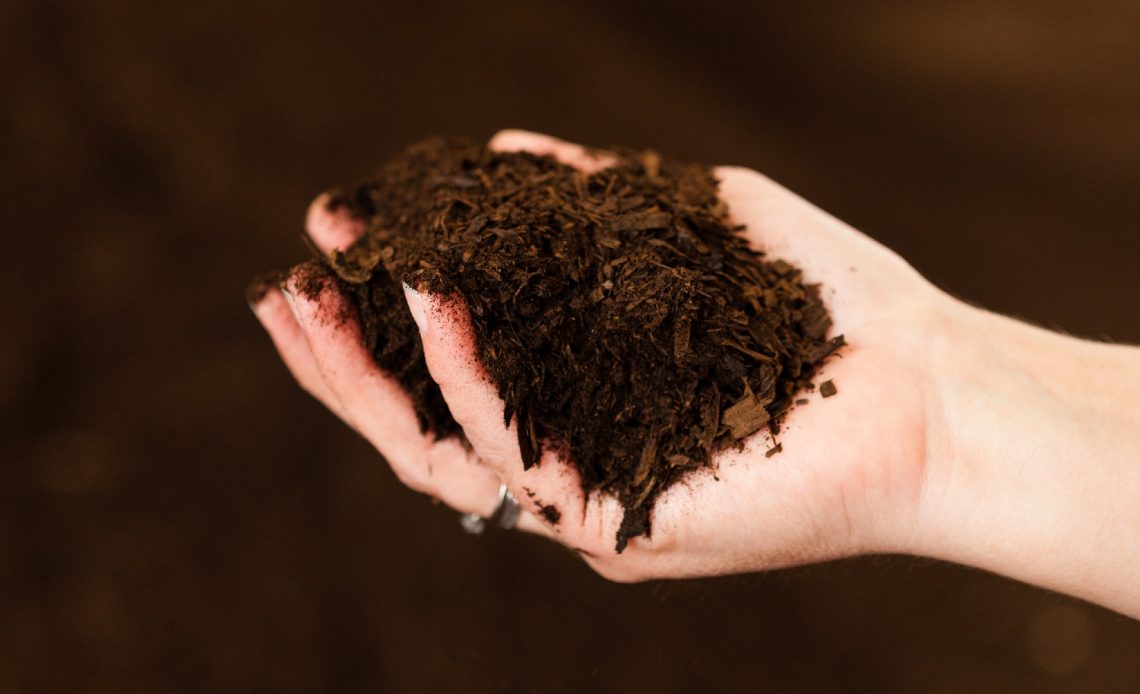

We’re here to help! Wild Yards is a completely free website that is 100% dedicated to helping you create a wildlife-friendly, sustainable yard. Read more
WildYards is reader-supported. When you buy a product through a link on our site, we may earn a comission. Every product is independently selected by our (obsessive) editors and our reviews are unbiased and objective. Read more about our mission or our privacy policy.
Any gardener will tell you no two soils are alike. There are sandy soils, loamy soils, and clay-rich soils, all with varying pH levels, drainage capacities, and vitamin and mineral levels. And for as many different types of soils as there are, there are even more fertilizers available to amend them. Two of the most common fertilizers gardeners utilize are manure and compost. But when you compare manure vs. compost, what’s the difference between the two?
Manure is animal dung, usually from horses, cows, and chickens. The best manures are a combination of feces collected from a variety of animals. Compost, by comparison, is a mixture of biodegradable waste, like shredded paper, dead leaves, lawn clippings, fruit peels, and overripe vegetables.
What is compost?
Nutrient-dense and full of organic materials, compost is what turns good gardens into great gardens. There are many ways to produce compost. Even if you only have a small backyard, you can start composting today with a 5-gallon bucket. This all-natural fertilizer is a combination of biodegradable materials that, when broken down, provide the plants in your garden with the nutritional building blocks they need to grow. Specifically, compost is comprised of:
- Green matter — This includes lawn clippings, weeds, leaves, flower heads, overripe fruits, and vegetable peels. Seaweed, algae, old flower arrangements, coffee grounds, tea bags, and freshwater from aquariums can also be included as green matter. These ingredients add a healthy dose of nitrogen to your compost heap.
- Brown matter — This category enriches your compost with carbon which supports healthy plant growth and good soil structure. Cardboard, shredded paper, 100% cotton fabrics, wood chips, sawdust, hay, ashes, dead foliage, and egg cartons are common sources of brown matter.
- Oxygen — Compost heaps produce gases that can spontaneously combust if left undisturbed. Mixing the compost regularly helps release trapped gases and aerate the compost. Drilling holes into your compost bins is critical for adequate air circulation.
- Water — As green matter breaks down, moisture is released into the compost. Mature compost is excellent for water retention and can be added to loose soils to help plants hold onto hydration.
Good compost contains a mixture of 50% green matter and 50% brown matter. A 1:1 ratio ensures your compost will be rich in good bacteria that benefit the soil. The enzymatic activity of these bacteria helps break down organic materials making them easier for plants to absorb.
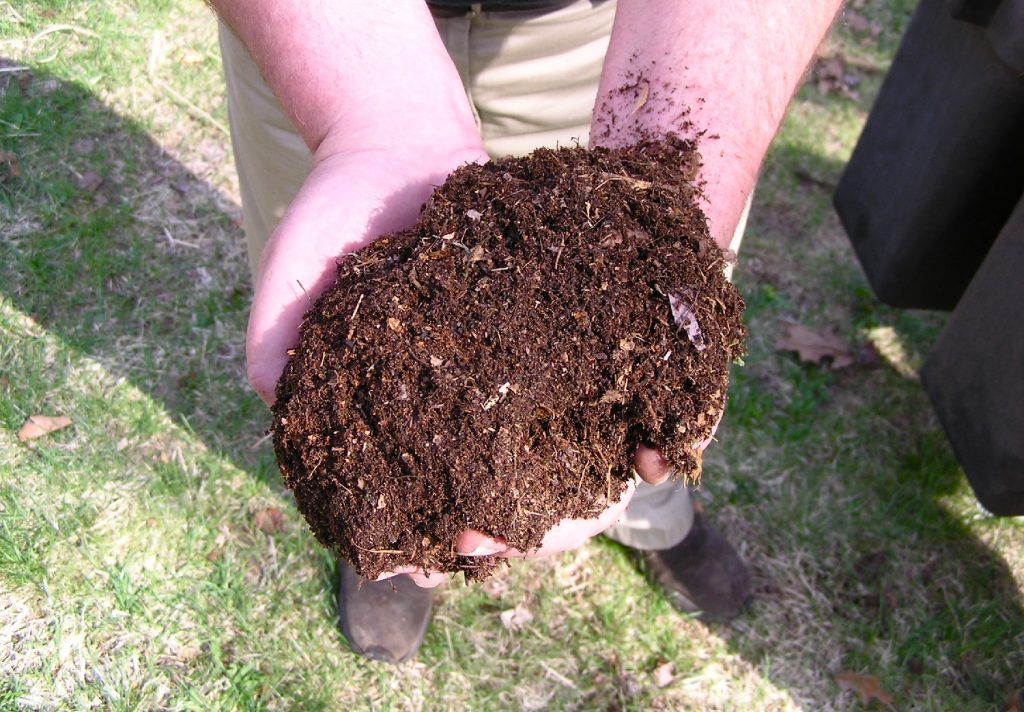
What is manure?
Manure is… well, there’s no delicate way to say this. It’s poop. Manure is animal dung, usually from cows, horses, and chickens, although llama, alpaca, goat, and sheep dung can be used, too. Manure is generally collected from herbivorous animals, as their excrement is most beneficial for gardening.
It’s worth noting that fresh dung does not make the best manure. Fresh dung contains excessive nitrogen levels, and it can actually kill plants if used as a fertilizer at this point. New dung should be allowed to dry out and degrade a bit before it’s used as a fertilizer. The process takes a few weeks.
The best manures are a mixture of different animal excrements. Local manure is best because it contains nutrients that your native soil is deficient in. While manure makes an excellent fertilizer for fruits and vegetables, it can spread E. coli bacteria, so it’s important to add manure to your garden 4 months before planting.
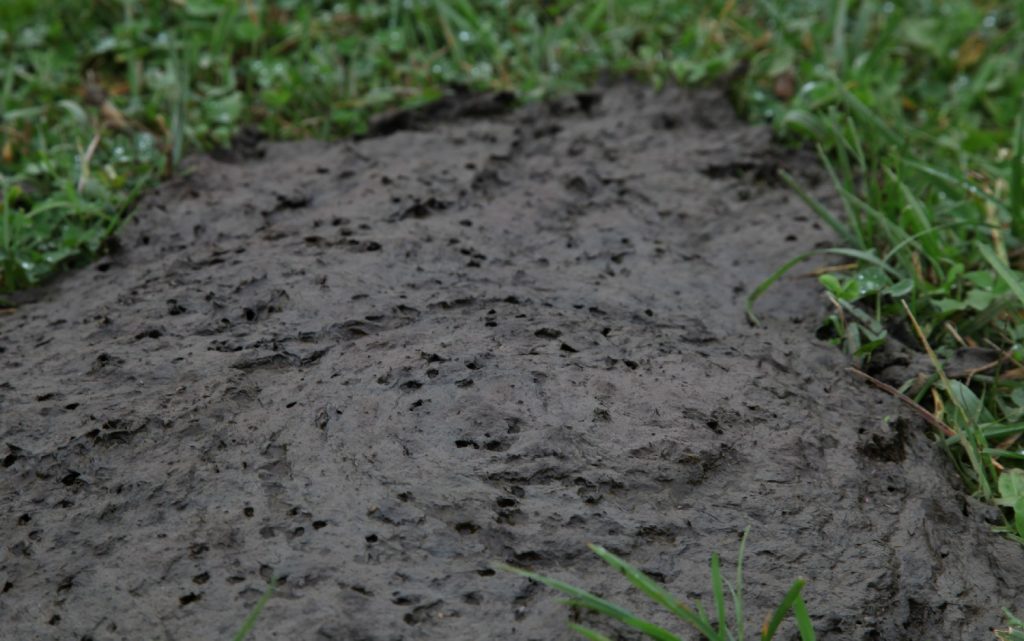
Manure vs. compost — fertilizing action
Both manure and compost can be used to create a general-purpose vegetable soil mixture that all of the plants in your garden will benefit from. But these two fertilizers play different roles in the soil, and one can’t take the place of the other.
Compost is an all-natural slow-release fertilizer
Most of the chemical fertilizers available at garden stores provide plants with a burst of nutrition. While that sounds like a good thing, it can actually end up putting your plants in shock or burning their tender young roots. Worst case scenario, these powerful fertilizers can wind up killing your plants.
But compost is an all-natural fertilizer that works by releasing nutrition slowly at a rate that won’t upset your plants. Compost supplies the plants with a steady source of vitamins and minerals as it breaks down over time.
Manure gives plants a dose of minerals fast
If the plants in your garden are suffering from mineral deficiencies and need relief fast, manure is a great alternative to prepackaged fertilizers. Manure that’s been allowed to age for a few weeks releases minerals more quickly than compost, but not so fast that it will put your plants in shock.
Unfortunately, once manure has released its minerals, it doesn’t have much nutrition left to offer. But this is why both manure and compost should be added to your soil. Manure helps provide quick nutrition for your plants, and by the time it’s no good, the compost has kicked in to provide plants with steady energy.
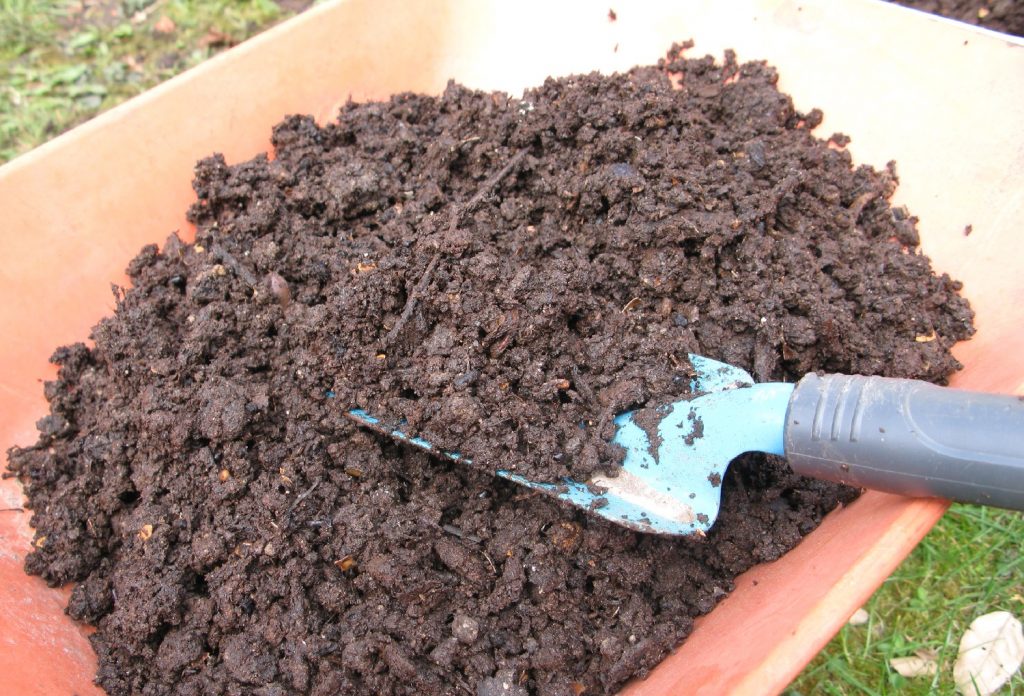
Manure vs. compost — nutritional breakdown
Now that you know the difference between manure and compost, let’s talk about how these two substances differ nutritionally speaking. Knowing which minerals these fertilizers contain will help you choose the right one for your garden. However, we recommend having your soil tested before applying any fertilizers to prevent nutritional imbalances.
Manure contains high doses of sulfur, calcium, and magnesium
Manure is one of the safest sources of sulfur, calcium, and magnesium. Again, storebought fertilizers that contain these minerals can burn plants. That means they’re generally unsafe for young and/or sick plants. But manure provides high doses of these nutrients in an absorbable form that won’t harm plants.
Sulfur helps plants turn nutrients into proteins, while calcium holds the cell walls of plants together and helps nitrogen and sugars circulate to different parts of the plant. Meanwhile, magnesium plays an important role in energy production by assisting plants in chlorophyll formation.
While manure can be added to any soil that’s nutrient deficient, it’s especially beneficial for leafy green vegetables. Tomato plants also like manure because it’s rich in calcium and improves fruit production.
Compost is rich in boron, copper, and iron
In addition to carbon and nitrogen, compost is full of trace minerals that help encourage plant growth. Minerals like boron, which aids in cellular development, and copper and iron, which help transfer oxygen to different parts of the plant, supporting healthy foliage.
Compost is also a good source of iodine, zinc, and manganese, all of which work together to keep plants in tip-top shape. Overall, compost is a much more potent fertilizer than manure, with an abundance of valuable nutrients and the potential to feed your plants for months.
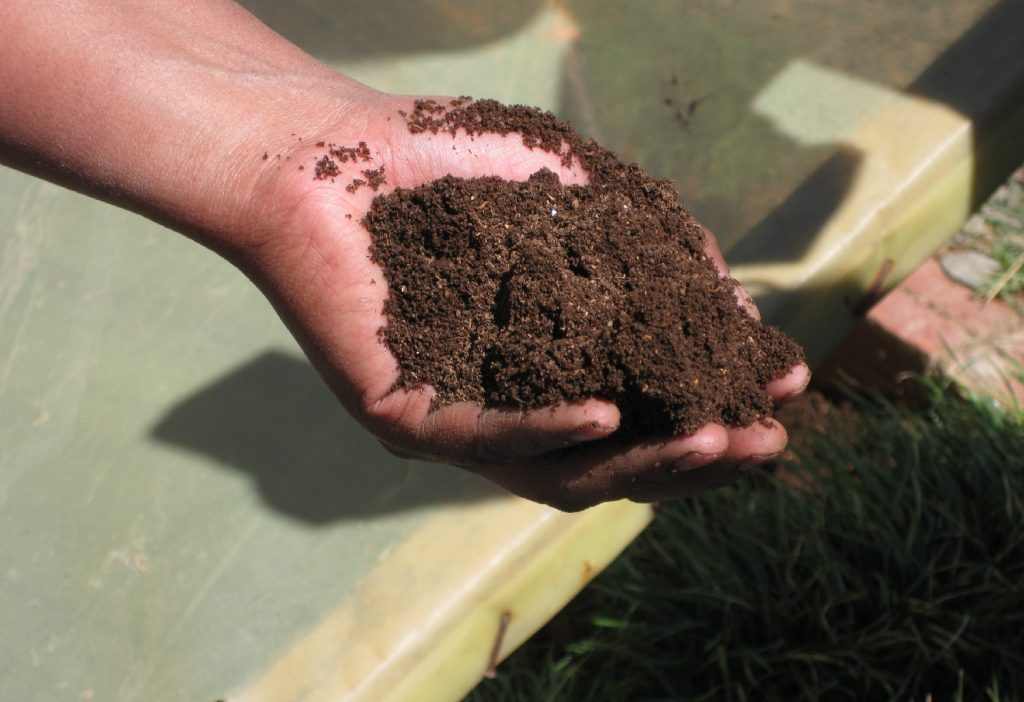
Manure vs. compost — soil enhancement
We know that manure and compost can provide the plants in your garden with valuable nutrition. But what else do these substances have to offer? How do manure and compost alter the soil?
Compost helps neutralize soil
When it’s been mixed properly, aged compost has a pH of 6 to 8, which is neutral to slightly alkaline. Compost helps neutralize soil that’s too alkaline, and works to raise the pH of acidic soils. Of course, this doesn’t happen overnight. It may take weeks to months for compost to alter your soil’s pH. But, over time, it will create a neutral pH, making your soil suitable for a wide variety of plants.
A heaping dose of compost also helps loosen packed soils, like clay. This makes it easier for roots to grow, so if you plan on growing root vegetables like carrots, potatoes, or radishes, compost is an excellent choice of fertilizer. Compost can be added to sandy soils to improve moisture retention making it easier to grow water-loving plants, like dogwood trees and lilies.
Manure alkalinizes soil
Most manure has a pH of 8 to 12. Consequently, manure works to alkalinize the soil, and it does so almost immediately. So if your soil is extremely acidic, or if you’d like to support plants that require alkaline soils, like thyme, oregano, or pink hydrangeas, manure should be your go-to fertilizer.
Like compost, manure aids in moisture retention. It can be mixed into soil or used as a topdressing. Spreading manure out as you would a mulch protects soil from moisture loss, especially during the warmer months. But if you’re looking for something to amend compacted soils, stick with compost. Manure can help loosen the soil a bit, but its effects are limited.
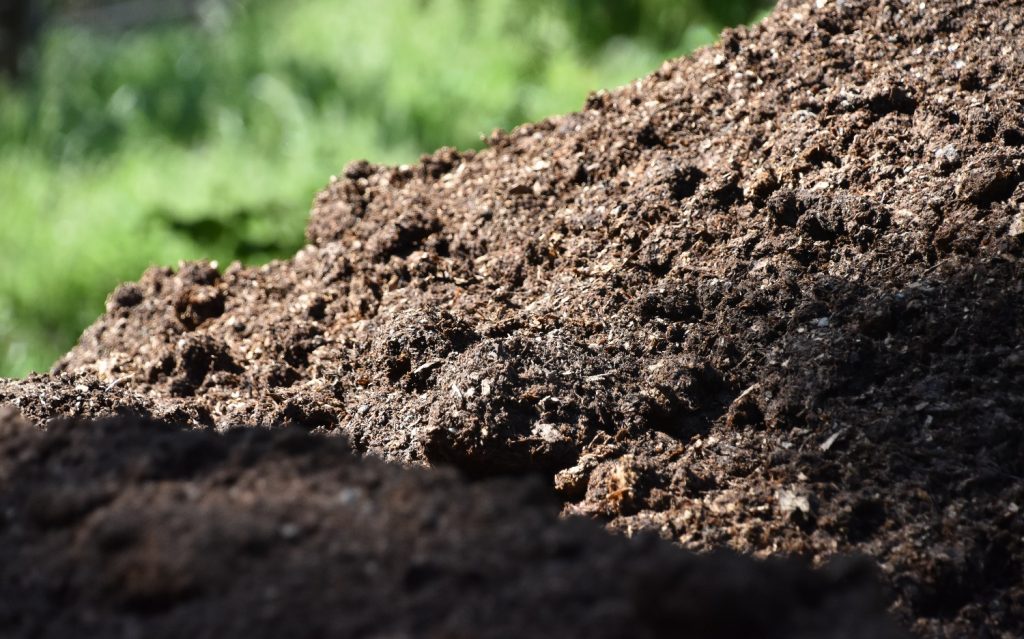
Manure vs. compost — plant health
Both manure and compost are valuable sources of nutrients. But these two natural fertilizers also have secondary effects on plant health. Let’s take a look at how manure and compost can improve the performance of your plants over time.
Manure prevents nutrient loss
Plants need sunlight to grow. But too much sunlight dries the soil out, and it can actually result in nutrient loss — especially during dry spells. Typically, manure is applied as a topdressing, and cast out over the soil where it acts as a mulch. Manure helps hold onto moisture, and acts as a barrier between the soil and the sun, helping to prevent nutrient loss.
One unexpected benefit of manure is that birds love it. They like to pick through the dried dung looking for seeds and bits of undigested grain. And while they’re on the ground foraging, they’ll notice any worms, flies, or grasshoppers feeding on your plants, and snack on them, too. So if you want to help your soil retain nutrients and keep pest levels down at the same time, manure can help.
Compost enhances disease-resistance
Because compost supports the cultivation of healthy bacteria in the soil, it also supports your plants’ immune function. Plants fertilized with compost are more disease-resistant than plants that aren’t.
Compost also helps attract worms. While some white worms, like grub worms and gnat larvae, are bad worms that can harm your plants, earthworms are highly beneficial for your soil. Worms help break down the nutrients in the soil, and their castings are highly absorbable for plants.
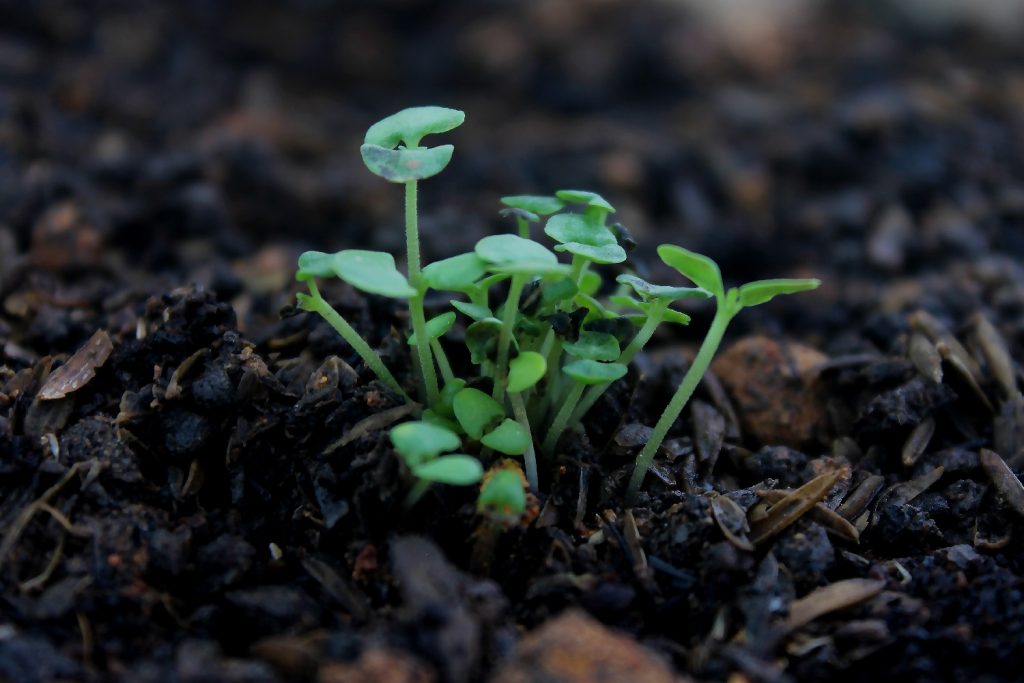
Manure vs. compost — which one is best?
Comparing manure to compost is like comparing apples to oranges. Neither one is the clear winner. They both have their pros and cons, and sometimes one is better suited for a job than the other.
Manure is best for fertilizing lawns
Manure is cheaper than compost because it’s easier to produce. For this reason, it’s the perfect choice for fertilizing your lawn — especially once it’s been dethatched. Dethatching is the process of removing the layer of dead foliage between the soil and the lawn. While this helps stimulate new growth, it also temporarily deprives the soil of nutrients and leaves it exposed to the sun’s harsh rays.
A thin layer of manure spread evenly over a newly dethatched lawn helps the soil stay hydrated. The quick release of basic nutrients provides your dethatched lawn with the minerals it needs to recover from the process. When it comes to supporting vegetation and native plants, manure is the better choice.
Compost works well for vegetable and container gardens
Like manure, compost can also be used as a topdressing. But it performs best when mixed into the soil. This prevents the compost from being exposed to sunlight, which results in nutrient loss. It also helps break up the soil and hold onto moisture. For these reasons, compost is much better for vegetable gardens and potted plants than manure.
Compost is a richer source of non-essential trace minerals that help fruits and vegetables produce better crops. If you’re growing plants that you intend to eat, you’re going to see much better results by using compost as fertilizer than manure (however a mixture of both is ideal).
Manure vs. compost — the final verdict
Whether compost is better than manure or vice versa depends on your garden’s unique needs. If you’re looking for a nutrient-dense natural fertilizer to help loosen the soil in your vegetable garden and flower pots, compost is usually the best option. But if you want to fertilize a large area to support native vegetation, manure is often better suited to the task.
Ultimately, neither of these substances will harm your plants. So feel free to experiment with varying doses of manure and compost to determine which of these organic fertilizers your garden likes best.
